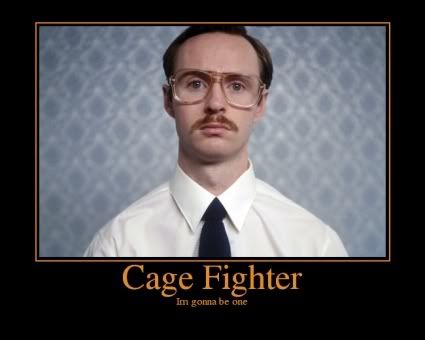Among the lush pickings of memorable lines from the 2004 movie Napoleon Dynamite, one of the best is Kip’s to his brother:
 “Napoleon, don’t be jealous that I’ve been chatting online with babes all day. Besides, we both know that I’m training to be a cage-fighter.” (Video from Hulu, if you’re rusty on the scene, feel free to skip.)
“Napoleon, don’t be jealous that I’ve been chatting online with babes all day. Besides, we both know that I’m training to be a cage-fighter.” (Video from Hulu, if you’re rusty on the scene, feel free to skip.)Well go Kip, I say. This line bubbled to the surface of my mind today when I was watching an interview with Truman Capote, dating from the mid-60s.
By all means skip the video above, but this one (non-embeddable, unfortunately) which I found via a Twitter lead is worth the time. (Yes, Capote’s voice is obnoxious, but deal with it and it’ll be worth it.)

Capote discusses becoming a writer, his book In Cold Blood and how his writing style change over time. His opening sentence is especially wonderful to keep in mind:
“If you are going to have a genuine career in the arts, it’s exactly like being a prize-fighter or a concert pianist. It isn’t something that you just take up one moment and drop the next. It’s an act of continuous concentration on your work and building the thing more and more toward its larger possibilities.”
It’s easy to forget that even the most excellent writers had to develop their skills. I’ve been slowly working my way through listening to In Cold Blood on long car rides. Capote is capable of giving the reader a great deal of information through the choicest details. The book’s opening paragraph:
For someone, like me, who reads this and thinks, “How did he do that? How can I do that?” His suggestion of training yourself like a prize-fighter is both a comfort and a rally.The village of Holcomb stands on the high wheat plains of western Kansas, a lonesome area that other Kansans call “out there.” Some seventy miles east of the Colorado border, the countryside, with its hard blue skies and desert-clear air, has an atmosphere that is rather more Far West than Middle West. The local accent is barbed with a prairie twang, a ranch-hand nasalness, and the men, many of them, wear narrow frontier trousers, Stetsons, and high-heeled boots with pointed toes. The land is flat, and the views are awesomely extensive; horses, herds of cattle, a white cluster of grain elevators rising as gracefully as Greek temples are visible long before a traveller reaches them.





No comments:
Post a Comment